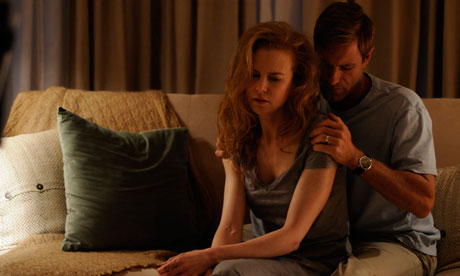
If you're a regular cinemagoer, what befalls Rabbit Hole's suddenly bereaved parents will come as no surprise. Like their counterparts in films ranging from Ordinary People to The Lovely Bones, Becca and Howie Corbett are comprehensively devastated. The customary grief rivalry, partner-blame, self-blame and passive-aggressive bickering over coping strategies arrive on cue. Recrimination, resentment and incomprehension lead as usual to extra-marital flirtation. Touchiness, contempt, rage and bitterness reign. Craziness takes hold, and time forgets that it's supposed to heal.
But you know what? For once, the movies seem to have got it right. Psychiatrists reckon that Rabbit Hole provides so accurate a portrait of parental grief that it should be used as a teaching aid. A study of 41 parents who, like Becca and Howie, had lost a child in a road accident, found that many of them came to see the world as a hostile place. The film's blame-gaming is, apparently, on the money. So is its clash over how to cope, and the gender-difference in attitudes taken. After seven years, the study's sample were still experiencing increased depression, above-average mortality, a drop in financial status and a high divorce rate.
Yet if the problems of those in the Corbetts' position are well understood, solutions remain elusive. The grief industry can offer only limited help. Everyone's different, and must find a different way through, so it's up to the patient and not the therapist to chart a course. Counselling may actually do harm. Professionals cannot readily resolve even the most pressing issue raised in the film.
Howie hangs on eagerly to reminders of his son: he treasures a tiny shoe and constantly replays home videos. Becca wants to remove all traces of her departed four-year-old: she rips his pictures from the fridge door and gives his clothes away. Who's right? Most experts have favoured "severing bonds" till now, but those who back "continuing bonds" are currently edging ahead. Similarly, Elisabeth Kübler-Ross's once-sacrosanct five stages of grief have now given way to less clear-cut analyses.
So, mothers and fathers like the Corbetts are pretty much left to writhe. Fortunately, there aren't that many of them: in England, only 5,000 children die in an average year. Yet elsewhere, parental bereavement is far from unusual. Globally, around eight million children a year die before they've reached the age of five. Many of their parents seem to survive without falling prey to persistent trauma. British parents also seemed to get by somehow when under-fives accounted for half of hospital deaths. Why has an ineluctable phenomenon become so impossible to handle in societies like our own?
Clearly, we now have fewer offspring per parent; serious harm befalls them more rarely, and when it does, religious consolation is less likely to be available. These things have doubtless left us more susceptible to meltdown. Yet Rabbit Hole suggests we may have inflicted on ourselves another, more avoidable vulnerability.
Among the most striking features of Becca and Howie's predicament is their isolation. As in other such films, the couple grapple with their loss in a state of claustrophobic reclusion. The problem is theirs and theirs alone to solve, as is emphasised by the conclusion, which shows them facing their uncertain future together but alone.
Other figures cross their stage, but impact only marginally on their drama. These include relations with whom they fail to relate, as much because of their own insistence as the relatives' reluctance. It's possible, therefore, to see the couple as victims of toxic fallout from the ascendency of the nuclear family.
At other times and in other places, grief has been a collective experience. Communal rituals have drawn in neighbours and lowly acquaintances as well as relatives, especially when it's a child who's been taken. Now we no longer even wear black. Mourning has been privatised, and the burden this imposes on the most egregiously bereaved has become understandably insupportable.
It's easy to see how those who have suddenly lost a child might become as irritable, self-obsessed, jealous, unstable and spiteful as the Corbetts. You can see why people might slink away from them, outwardly sympathetic but secretly repelled and even subconsciously fearful of contagion.
Maybe they shouldn't. If it takes a village to raise a child, perhaps it takes more than a lonely, anguished couple to mourn one.

